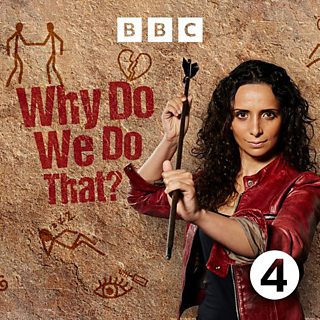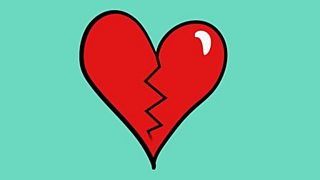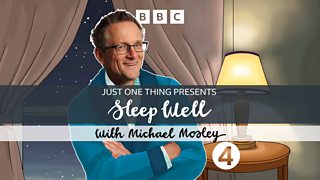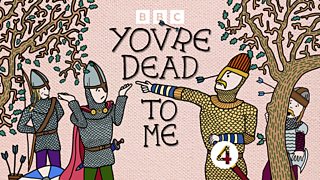Six things we learned about heartache from Why Do We Do That?
Why do we kiss? Why do we doomscroll? Why do we sit down to go to the loo? Why Do We Do That? is a new Radio 4 podcast series in which palaeoanthropologist Ella Al-Shamahi takes a close look at the cultural, historical and evolutionary story behind everyday human behaviour.
In the first episode, Ella looks at the nature of heartbreak. Why does it hurt so much? Can a heart actually be broken? Helping her piece together the feelings and the facts behind them are presenter Clara Amfo and Dr Freddy van der Veen from Erasmus University in Rotterdam.
Here are six things we learned about heartbreak…
1. Heartbreak is everywhere
If you have experienced heartbreak, you are far from alone. One study of 4300 people found that over 80 percent have had their hearts broken at some point in their lives.
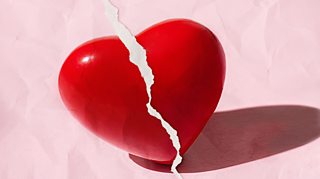
2. The name describes the pain
Heartbreak or heartache are words in English that describe something physical, specifically pain. Many languages use words or phrases that basically mean heart pain when describing emotional pain, such as the French “coeur brisé” and the Italian “crepacuore”.
3. There are various symptoms
While it may vary, Ella and Clara describe some common symptoms of heartbreak. Ella describes how her breakup left her “whole chest in pain” and friend even asked her “are you sure this is just heartache or should you actually go see your doctor?”
Clara likens the feeling to having “an anvil on your chest”. “When you get excited about something, your heart beats really fast,” Clara says, “so when that is taken away from you, and that joy that you thought was going to have on tap is no longer available, I reckon your heart feels it physically.”
4. Romantic rejection causes real pain
Among the studies that link heartbreak to actual physical pain is one from Dr Freddy van der Veen from Erasmus University in Rotterdam. Freddy’s study – catchily-titled “Don’t You Want Me, Baby?” – measured how people responded to being accepted or rejected on a lab-designed online dating app. The responses showed that heart rate slowed in response to rejection.

Dying of a broken heart really is a thing, it's called "broken heart syndrome".
As Freddy points out, he can’t ethically measure real heartbreak. However, the next best thing was studied at the University of Michigan. Scientists there conducted an experiment where they showed participants photos of ex-partners who broke up with them in the last six months. They concluded that these pictures triggered areas of the brain that are connected to physical pain. Other emotions, such as anger, did not appear to have the same effect.
“What you see when you do this is the same areas in the brain popping up as you see with physical pain,” Freddy says, “So you actually experience pain from this romantic rejection or social rejection.”
5. You can die from a broken heart
Dying of a broken heart really is a thing, it’s called “broken heart syndrome” or “Takotsubo cardiomyopathy”, a condition that can be triggered by an extreme emotional or stressful event.
“People can die from a broken heart,” confirms Dr van der Veen. “You can actually see the damage on the heart from this stressful event.” Many people recover from it – but in some cases, like in the elderly or those with a heart condition, it can be fatal.
The exact cause of the condition is unknown, but experts think it might be a surge in adrenaline that triggers changes in the heart muscle.
Ella remembers being told her grandparents died of broken hearts. This now makes more sense to her. And it does for Clara too: “It really checks out for me. As with the recovery time for any kind of ailment, when you’re younger, you’ve got the physical wherewithal to bounce back.”

Why does heartbreak physically hurt?
Dr Freddy van der Veen explains his study.
6. Painkillers can help!
Because the pain of heartache is real pain, to some extent it can be treated with painkillers such as paracetamol.
The annoying, but exciting, thing about love is that heartbreak is unavoidable.Clara Amfo
Longer-term, however, the defence comes from within. “The pain is really teaching you to evaluate the situation you are in and to avoid it [rejection] the next time,” says Dr van der Veen.
Easier said than done, of course. As Clara points out, “The annoying, but exciting, thing about love is that heartbreak is unavoidable.”
Ella says that meeting her baby nephew was a kind of closure for her. “That munchkin filled my heart with so much love, so much warmth that my heart and my chest felt actually physically full.”
“The cure might be time, closure, therapy, a new love, and it might be a reminder of the love you already have in your life. The love you just haven't spent enough time with.”
Listen to Why Is Heartbreak So Painful? on 主播大秀 Sounds
More from 主播大秀 Radio 4
-
![]()
On Love and Heartbreak
Vogue dating columnist and author Annie Lord returns to her first heartbreak.
-
![]()
How to mend a broken heart
Tips for healing heartbreak from journalist and author Rosie Green.
-
![]()
Sleep Well with Michael Mosley
Get comfortable, relax and drift off with Dr Michael Mosley's new series.
-
![]()
You're Dead To Me
Greg Jenner brings together the best names in comedy and history to learn and laugh about the past.
